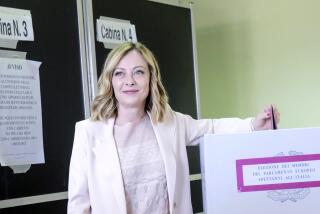Kosovo Voters Brave Serb Intimidation
- Share via
PRIZREN, Yugoslavia — Grooming the next battlefield for Yugoslavia’s roving war, Serb police arrested ethnic Albanian activists, seized ballot boxes and harassed U.S. election monitors Sunday in a vain attempt to disrupt an independence vote in Serbia’s restive province of Kosovo.
Despite intimidation by heavily armed Serbian police and Yugoslav federal troops patrolling in armored vehicles, Albanians flooded secret polling places to vote for a president and Parliament committed to independence from the Serbian republic.
Kosovo’s revered Albanian community leader, writer Ibrahim Rugoza, was the only candidate on the presidential ballot. He is expected to announce an autonomous Kosovo republic within a few days, possibly triggering a bloody confrontation with Serbian forces vehemently opposed to Kosovo’s secession.
“They can come here and try to stop us. They can even create a massacre. But we will defend our independence. We will use our bare hands,” said Bebri Gejku, a jobless teacher in this burdened city of ancient mosques and shantytowns.
Kosovo’s ethnic time bomb also threatens European security. If Serbia trains its guns on poorly armed Kosovans, neighboring Albania can be expected to come to the aid of its ethnic brothers. Any support from Tirana, in turn, is likely to provoke attack by Serbian forces, prodding the Yugoslav crisis into an international dimension.
The 1990 Paris treaty at the Conference on Security and Cooperation in Europe, which now includes Albania and three newly independent former Yugoslav republics, promised to replace Cold War-era military blocs with a pan-European commitment to collective security.
If rampaging federal troops loyal to Serbian President Slobodan Milosevic move into Albania, as many observers in the Balkans expect, Europe and the United States could come under intense pressure to intervene militarily.
The Kosovo vote threatens to spark a new stage of violence because a pro-independence legislature is assured of election. More than 90% of Kosovo’s 2 million residents are ethnic Albanians and staunchly oppose Serbia’s iron-fisted rule of their province.
But Yugoslavia’s 10 million Serbs are deeply emotional in their attachment to Kosovo, which was Serbia’s medieval heartland and the scene of its conquest by Ottoman Turkey in 1389. Although Kosovo is now predominantly Albanian, Belgrade has vowed to crush any Albanian effort to wrest it from Serbian control.
In this tense province enveloped in an atmosphere of impending doom, many concede that the election may provoke a blood bath. But the Albanians, who have been living under the Serbian national bootheel for three years, say they can no longer submit to repression.
Albanian adults have been fired from their jobs. Children are denied the right to study in their own language. Most of the ethnic Albanians, though full citizens and natives of Yugoslavia, fear they will be expelled to Albania once Serbian guerrillas conquer Bosnia-Herzegovina, freeing the military manpower needed to drive Albanians out.
That armed might was flaunted here Sunday when police pushed into voting places and snatched ballots to thwart the election.
But organizers played a game of cat and mouse with the Serbian forces, spiriting their voting lists and ballot boxes to mosques and private homes. Tractors and trucks blocked the rutted village roads, and lookouts alerted polling officials to the approach of police, providing time to hide the election materials and scatter waiting voters.
“We were not allowed to vote at schools or other public places,” said Fatmir Pireqi, an election coordinator in Prizren for the Albanian political alliance, the Democratic League of Kosovo. “But our people knew to come to the mosque.”
Outside the walled mosque, hundreds of Prizren’s Albanian voters danced and pounded drums to celebrate what they saw as a triumph over Serbian police efforts to spoil their vote.
“Now is the time, but we expect a negative reaction from Belgrade,” said Suzana Dida, a 38-year-old office clerk.
Like many Kosovo Albanians who have hurled themselves lemming-like toward a confrontation with the heavily armed Serbs, Dida said she expects Western Europe and the United States to come to Kosovo’s rescue militarily if their move toward autonomy results in war.
But the West has been slow to respond to savage attacks by Serbian forces bent on conquering Bosnia-Herzegovina, and initial indications for the looming Kosovo conflict suggest that Europe and the United States may continue to keep their distance from the Yugoslav war.
The U.S. Congressional Human Rights Foundation sent a small team of election monitors to the Kosovo vote. But the foundation’s director, Konrad Huber, said the team was “not in a position, strictly speaking, to judge the legality of the elections.”
Paul Behrends, an aide and foreign affairs adviser to Republican Rep. Dana Rohrabacher of Orange County, said he considers the vote “a free expression of self-determination.”
Behrends and another U.S. monitor, Max Primorac of the Inter-American Security Foundation, were stopped at gunpoint as they drove into Prizren and were detained at police headquarters for nearly two hours.
“While we were being held at the police station, they were pulling in bags of ballots they had stolen,” Behrends said, referring to Serbian police.
In the Kosovo capital of Pristina, Albanian political leaders reported various disruptions throughout the province but said that more than 90% of eligible voters were nevertheless thought to have cast their ballots.
Based on the massive police presence in Kosovo, and vitriolic propaganda started by Belgrade politicians, Albanians concede that Kosovo is likely to suffer the same bloody fate as did Slovenia, Croatia and Bosnia-Herzegovina.
Independence Vote: Ethnic Albanians in Serbia’s restive province of Kosovo went to the polls Sunday.
More to Read
Sign up for Essential California
The most important California stories and recommendations in your inbox every morning.
You may occasionally receive promotional content from the Los Angeles Times.














